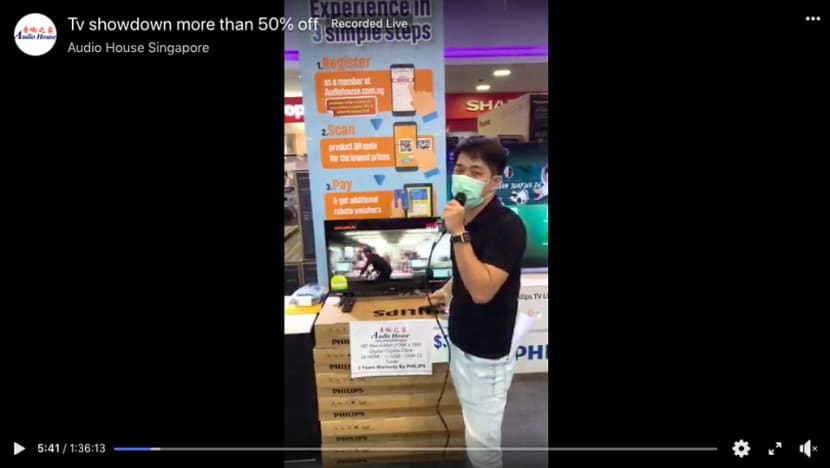COVID-19: For some businesses, enhanced online browsing to drive sales could become a new norm
While the circuit breaker saw some businesses rethinking how they can engage clients, the benefits of an enhanced online browsing experience may be set to stay even though the circuit breaker is over.

An mc.2 salesperson uses Facebook live to introduce products to customers. (Facebook/mc.2)
SINGAPORE: The glass doors open up into a spacious lobby where a friendly salesperson waits to give you a tour around the showroom.
As he takes you through the colourful displays, he makes sure to stop at every product and introduce it in careful detail. There are curtains by fashion designer Jean Paul Gaultier, motorised blinds and even smart partition screens that can be toggled between opaque and transparent.
But this is not a physical tour of curtains and blinds retailer mc.2’s showroom. This is mc.2’s virtual group buy demo, a Facebook Live tour for anyone who logs on to their livestream.
“Why we use Facebook live to conduct this group buy demo is because it’s interactive. The viewers can ask questions any time and our salespeople will be able to answer them. Or if they want to see certain products … we can always pull them out and let them see,” said mc.2 founder Wilson Chew.
The company has seen some success with the platform, attracting over 100 viewers for their first live session. This is double the number of people they usually have in their shop at any one time.
Developing an enhanced online browsing experience is one way companies have adapted to the new circuit breaker measures. All non-essential businesses have to suspend operations for the duration of the circuit breaker.
As companies see the benefits of going online, several of them told CNA that they plan to incorporate digital selling methods into their businesses even though the circuit breaker has ended.
ONLINE RETAIL HERE TO STAY
With people forced to stay indoors, businesses that have traditionally relied on physical sales have taken to new platforms, including livestreams and video conferencing tools.
PropNex Realty’s agents use Zoom and Skype to contact customers. The company also has its own Personal Assistant App, which helps their salespeople call up project information, financial calculators and analyses for them to enhance their presentation and “add value” to clients, said CEO Ismail Gafoor.
“As the art of communicating via platforms like Zoom or Skype is definitely different than face to face interaction, our salespersons are also provided with training to boost their confidence in terms of delivery and presentation via virtual platforms,” he added.
According to Mr Gafoor, while the volume of sales may not be comparable to those conducted through physical viewings, it is “encouraging”, with PropNex salespeople closing more than 1,000 transactions during the circuit breaker.
Digitalisation has improved productivity and speed for PropNex, as buyers can shortlist two to three houses online before viewing and buying, compared to viewing 10 to 15 residential properties physically. Paying deposits and signing leases have also gone online.
“We are witnessing buyers in the market embracing new strategies in their property journey,” said Mr Gafoor, adding that the company was hoping to incorporate these methods in the future.

Meanwhile, home appliance retailer Audio House has adopted Facebook livestreaming, with their salespeople also learning how to use Whatsapp, calls and email to sell appliances.
The firm also has a one-to-one customisation service called the Audio House Online Concierge Service and a same-day delivery service.
With over 1,800 viewers on a recent Facebook live, managing director Alvin Lee said that the response was “very good”, as it proves that customers are “willing to accept new ways of selling electronics”.
Before the circuit breaker, 95 per cent of their sales were made in person.
However, as customers get used to shopping online, Mr Lee said that the company plans to incorporate the chat services and the online concierge service into their sales methods.
“This circuit breaker gave us insight into new customer behaviour in the future. Because of this two to three months, with customers purchasing online - we believe that for certain customers, this will become their norm in the future,” he said, adding that Audio House would expand its online concierge service for customers who prefer to shop at home.
Even though the company will still rely on physical sales, Mr Lee estimated that online sales could go up to 10 per cent after the circuit breaker.
“A lot of people see the circuit breaker measures as a threat to the business and the industry. To us, it’s not a threat, it was also an opportunity to explore the business. It gave us more opportunity as well,” he said.
SUPPORTING AN ONLINE PRESENCE
While experts said that the circuit breaker would push more companies online due to changing customer expectations, the longevity of digital sales would depend on whether sellers can sustain an online and physical presence.
“With most staying at home and spending more time on social media, marketers are making sure they are where their customers are – on social media. Hence, online shopping has witnessed a boom,” said Assoc Prof Ang Swee Hoon from NUS Business School’s marketing department.
While millennials and those from Gen Z have contributed to the boom, baby boomers - who generally have more disposable income - have also started to adapt to online retail shopping, she said.
READ: COVID-19: Retailers struggle amid uncertainties about reopening, recovery of sales
READ: Landlords to give SME tenants more rental relief under proposed amendments to COVID-19 laws
The longer the pandemic lasts, the more likely consumers are going to get used to online shopping, with the habit becoming “sticky”. Brick-and-mortar shopping may then “become the exception rather than the norm”, she added.
“There will always be a segment of consumers who are raring to do physical shopping. But I see the number of consumers becoming more comfortable with online shopping increasing.
“It would also vary by product category. For products that require fitting (e.g. shoes), online shopping may be limited,” said Assoc Prof Ang.
But even with changing customer expectations, moving to online sales would depend on the companies' ability to support their digital presence, said Singapore Polytechnic School of Business lecturer Lim Xiu Ru.
“Depending how business picks up, perhaps retailers might not really be looking at employing someone full-time to manage online channels for the time being. So the existing staff will have to balance. Whether (online sales) stays, it really depends on the retailer, whether they are able to support these options,” she said.
BOOKMARK THIS: Our comprehensive coverage of the coronavirus outbreak and its developments
Download our app or subscribe to our Telegram channel for the latest updates on the coronavirus outbreak: https://cna.asia/telegram












